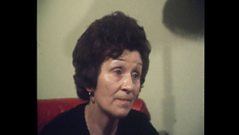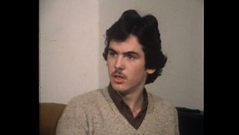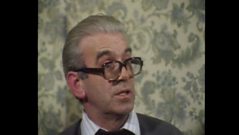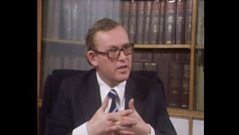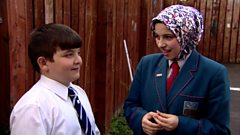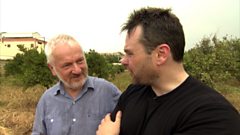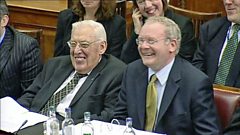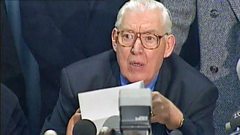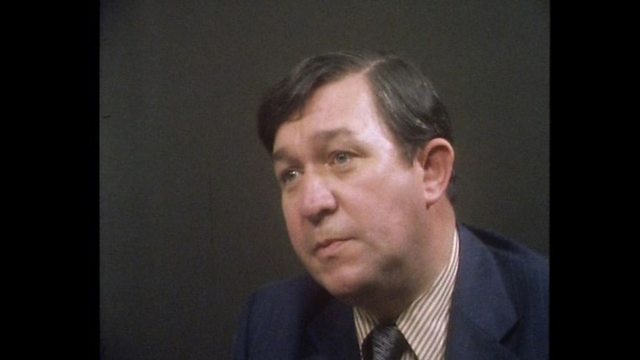
Giuseppe Conlon is an unlikely terrorist
Solicitors Ted Jones and Harry Disley discuss the case against Giuseppe Conlon and Pat O’Neil, both accused of involvement with the 1974 Guildford and Woolwich pub bombs.
Reporter Gavin Esler speaks to Belfast solicitor Ted Jones and Guildford solicitor Harry Disley about the case against the Maguire Seven (please see context below).
Esler first meets Ted Jones, the Conlon family solicitor, in Belfast. Mr. Jones states that had Giuseppe Conlon and his co-accused been tried in Belfast the trial would probably have taken place in front of a judge (the Diplock court system), rather than a judge and jury. In cases where the only evidence is of a forensic nature judges in Belfast have shown themselves aware of the possibility of innocent contamination.
Esler then meets Harry Disley in Guildford. Mr. Disley is Pat O’Neill’s solicitor (Pat O’Neill was arrested with Giuseppe Conlon and five others at the Maguire family home). Given the police description of the seven accused, when Mr. Disley first met Pat O’Neill in police cells he expected to encounter a monster; instead he met a very pleasant individual who was utterly bewildered by the situation in which he found himself. Mr. Disley also describes Giuseppe Conlon as an unlikely terrorist – he perceived Mr. Conlon as a man in ill health who had travelled to England as a dutiful father concerned for his son, Gerry Conlon.
Mr. Disley goes on to state that his client, Pat O’Neill, on being released by police had approximately three days to abscond should he have wished to; instead, thinking that his arrest was a bit of a joke, he simply went back to work. Mr. O’Neill was subsequently sentenced to 12 years imprisonment for possession of explosives.
CONTEXT
On 5 October 1974 the Provisional Irish Republican Army (PIRA) targeted Guildford, Surrey, because it was situated close to a number of garrison towns. The PIRA planted two six-pound gelignite bombs in two pubs. The first exploded just before 9.00pm in the Horse and Groom, destroying the front of the building and shattering the windows of neighbouring shops.
It killed Paul Craig, a plasterer (22 years old); two members of the Scots Guards, William Forsyth (18) and John Hunter (17); and two members of the Women’s Royal Army Corps, Caroline Jean Slater (18) and Ann Ray Hamilton (19). A further sixty-five persons were wounded.
After the first explosion, other public houses were evacuated, including the Seven Stars where the second bomb exploded at approximately 9.35 p.m. without causing any serious injuries.
On November 7 1974 Gunner Richard Dunne, a soldier (42) and Alan Horsley, a sales clerk (20) were killed when a PIRA bomb exploded in the King’s Arms in Woolwich. Twenty-six people, including five soldiers, were injured.
In December 1974 the police arrested three men and a woman: Gerry Conlon, Paul Hill, Patrick Armstrong and Carole Richardson. In October 1975 these four were convicted of the Guildford and Woolwich bombings and given life sentences. The group was known as the Guildford Four.
On 4 March 1976 the Maguire Seven were convicted of making the explosives used in these bombings. The Maguire Seven were: - Anne Maguire, Patrick Maguire (Anne’s husband), Patrick Maguire (son of Anne and Patrick), Vincent Maguire (son of Anne and Patrick), Sean Smyth (brother of Anne), Patrick O’Neill (family friend) and Giuseppe Conlon (brother-in-law of Anne Maguire and father of Gerry Conlon).
Over the years, the cases of the Guildford Four and the Maguire Seven came under increasing legal scrutiny and the range of those seeking a review of the convictions extended widely. On 17 October 1989 it was announced that corruption proceedings would be taken against the police involved in the conviction of the Guildford Four. Two days later, with the exception of Paul Hill, those convicted for the bombings were released. This followed an announcement by the Director of Public Prosecutions that it would be wrong for the Crown ‘to seek to sustain’ the convictions of 1975 on the basis of confessions that they had later retracted. The Court of Appeal had decided that the DPP in 1975 had suppressed scientific evidence which conflicted with the confessions. Paul Hill remained in custody because he was implicated in a case that had not yet been resolved. His conviction was eventually quashed in April 1994.
On 26 June 1991 the Court of Appeal overturned the sentences on the Maguire Seven. All of them had completed their sentences. Afterwards many criticised the court for dismissing most of the grounds of appeal and had simply concluded that the hands of the convicted could have been innocently contaminated with nitro-glycerine.
Duration:
This clip is from
More clips from Giuseppe Conlon and the Bomb Factory
-
![]()
PIRA bomb England
Duration: 04:08
-
![]()
Patrick Maguire recalls his arrest
Duration: 01:43
-
![]()
Giuseppe Conlon is arrested
Duration: 02:06
-
![]()
Flaws in forensic evidence
Duration: 05:38
More clips from Spotlight
-
![]()
Hamza and Salam's escape—29/09/2015
Duration: 01:59
-
![]()
A Long Way from Clare to Here—29/09/2015
Duration: 02:25
-
![]()
Paisley and the Good Friday Agreement—Paisley and the Pretender
Duration: 02:13

